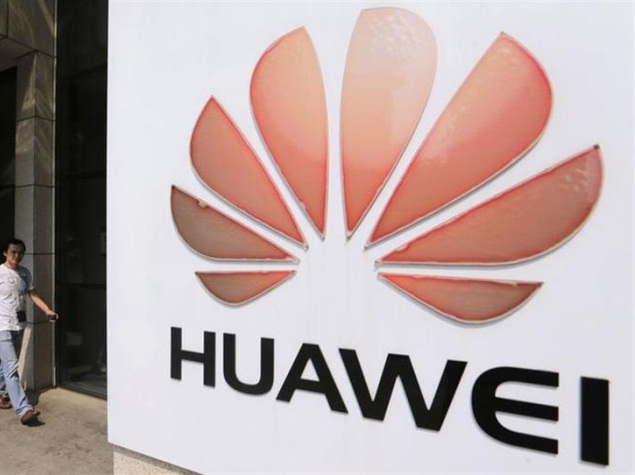- Home
- Internet
- Internet News
- Huawei 'condemns' reported NSA infiltration of its servers
Huawei 'condemns' reported NSA infiltration of its servers

The New York Times and German magazine Der Spiegel reported this weekend, citing documents leaked by former U.S. security contractor Edward Snowden, that the NSA had obtained sensitive data and monitored Huawei executives' communications.
"If the actions in the report are true, Huawei condemns such activities that invaded and infiltrated into our internal corporate network and monitored our communications," Huawei's global cyber security officer, John Suffolk, told Reuters.
"Corporate networks are under constant probe and attack from different sources - such is the status quo in today's digital age," said Suffolk, defending Huawei's independence and security record, saying it was very successful in 145 countries.
The New York Times said one goal of the NSA operation, code-named "Shotgiant", was to uncover any connections between Huawei and the Chinese People's Liberation Army. But it also sought to exploit Huawei's technology and conduct surveillance through computer and telephone networks Huawei sold to other nations.
If ordered by the U.S. president, the NSA also planned to unleash offensive cyber operations, the newspaper said.
The paper said the NSA gained access to servers in Huawei's sealed headquarters in Shenzhen and got information about the workings of the giant routers and complex digital switches the company says connect a third of the world's people.
Der Spiegel said the NSA copied a list of more than 1,400 clients and internal training documents for engineers. It said the agency was pursuing a digital offensive against the Chinese political leadership, naming former prime minister Hu Jintao and the Chinese trade and foreign ministries as targets.
"If we can determine the company's plans and intentions," an analyst wrote in a 2010 document cited by the Times, "we hope that this will lead us back to the plans and intentions" of the Chinese government.
The Times noted that U.S. officials see Huawei as a security threat and have blocked the company from making business deals in the United States, worried it would furnish equipment with "back doors" that could enable China's military or Chinese-backed hackers to swipe corporate and government secrets.
"We certainly don't build 'back doors'," Huawei security chief Suffolk said. Suffolk, who is British, said the company never handed over its source codes to governments either.
"I can't say what American firms do. We have never been asked to hand over any data to a government or authority or to facilitate access to our technology," he said. "And we wouldn't do this either. Our position on this point is very clear."
U.S. officials deny the NSA spies on foreign companies to give U.S. firms a competitive edge, though they acknowledge that in the course of assessing the economic prospects or stability of other countries, U.S. agencies might collect data on firms.
The Times and Der Spiegel articles were published just days before Chinese President Xi Jinping visits Europe and will hold talks with German Chancellor Angela Merkel, herself reportedly a target of surveillance by the NSA, like some German companies.
Former NSA chief Michael Hayden - who ran the agency from 1999-2005 and then ran the Central Intelligence Agency (CIA) until 2009 - told Der Spiegel in a separate interview that the United States had underestimated the reaction of the chancellor and the German population to revelations of mass surveillance.
Hayden said he was not prepared to apologise for U.S. intelligence agencies having had another nation under surveillance. "But I am ready to apologise for having us having made a good friend look bad," he said. "Shame on us, it was our mistake."
© Thomson Reuters 2014
Catch the latest from the Consumer Electronics Show on Gadgets 360, at our CES 2026 hub.
Related Stories
- Samsung Galaxy Unpacked 2025
- ChatGPT
- Redmi Note 14 Pro+
- iPhone 16
- Apple Vision Pro
- Oneplus 12
- OnePlus Nord CE 3 Lite 5G
- iPhone 13
- Xiaomi 14 Pro
- Oppo Find N3
- Tecno Spark Go (2023)
- Realme V30
- Best Phones Under 25000
- Samsung Galaxy S24 Series
- Cryptocurrency
- iQoo 12
- Samsung Galaxy S24 Ultra
- Giottus
- Samsung Galaxy Z Flip 5
- Apple 'Scary Fast'
- Housefull 5
- GoPro Hero 12 Black Review
- Invincible Season 2
- JioGlass
- HD Ready TV
- Laptop Under 50000
- Smartwatch Under 10000
- Latest Mobile Phones
- Compare Phones
- Tecno Spark Go 3
- iQOO Z11 Turbo
- OPPO A6c
- Samsung Galaxy A07 5G
- Vivo Y500i
- OnePlus Turbo 6V
- OnePlus Turbo 6
- Itel Zeno 20 Max
- Lenovo Yoga Slim 7x (2025)
- Lenovo Yoga Slim 7a
- Lenovo Idea Tab Plus
- Realme Pad 3
- Garmin Quatix 8 Pro
- NoiseFit Pro 6R
- Haier H5E Series
- Acerpure Nitro Z Series 100-inch QLED TV
- Asus ROG Ally
- Nintendo Switch Lite
- Haier 1.6 Ton 5 Star Inverter Split AC (HSU19G-MZAID5BN-INV)
- Haier 1.6 Ton 5 Star Inverter Split AC (HSU19G-MZAIM5BN-INV)

















